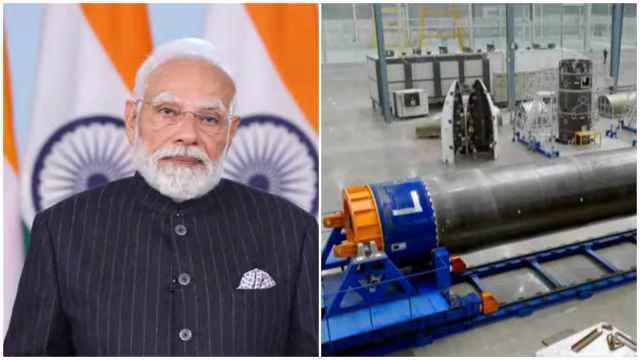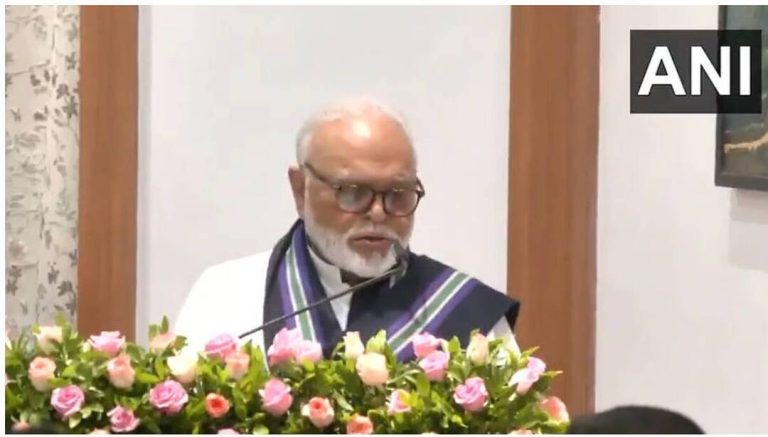
PM Modi Unveils Vikram-1, India’s First Privately Developed Orbital Rocket
In a historic moment for India’s space sector, Prime Minister Narendra Modi on Thursday inaugurated the new Infinity Campus of space startup Skyroot Aerospace via video conferencing. The ceremony also marked the unveiling of Vikram-1, India’s first privately developed orbital rocket. This significant milestone is a testament to the rapid progress India is making in the field of space technology and exploration.
The Infinity Campus, located in Hyderabad, is a state-of-the-art facility that will serve as the headquarters of Skyroot Aerospace. The campus is designed to be a hub for innovation and research, with cutting-edge infrastructure and equipment to support the development of advanced space technologies. With the inauguration of the Infinity Campus, Skyroot Aerospace is poised to become a leading player in India’s thriving space industry.
During the launch, Prime Minister Modi expressed his enthusiasm and pride in the achievements of Skyroot Aerospace. “It’s a significant leap forward for India’s space sector,” he said, highlighting the importance of private sector participation in the country’s space program. The Prime Minister’s words reflect the government’s commitment to supporting and encouraging private enterprises in the space sector, which is expected to drive growth and innovation in the industry.
One of the key features of the Infinity Campus is its ability to produce one rocket every month, according to Skyroot Founder Pawan Chandana. This capacity will enable Skyroot Aerospace to meet the growing demand for launch services in the country and beyond. The company’s ability to manufacture rockets at a rapid pace will also help to reduce the cost of access to space, making it more affordable for businesses, governments, and other organizations to launch their satellites and other payloads into orbit.
The unveiling of Vikram-1, India’s first privately developed orbital rocket, is a major achievement for Skyroot Aerospace. The rocket is named after Dr. Vikram Sarabhai, a renowned Indian scientist and space pioneer who played a key role in the development of India’s space program. Vikram-1 is a significant milestone in the company’s efforts to develop a reliable and efficient launch vehicle that can carry small satellites into orbit.
The development of Vikram-1 is a testament to the capabilities of Indian engineers and scientists, who have worked tirelessly to design and build the rocket from scratch. The rocket’s success will pave the way for future launches and will help to establish India as a major player in the global space industry. With Vikram-1, Skyroot Aerospace is poised to capture a significant share of the growing market for small satellite launches, which is expected to drive growth and revenue for the company in the coming years.
The inauguration of the Infinity Campus and the unveiling of Vikram-1 are significant events that highlight the progress India is making in the space sector. The country has a long history of achievements in space exploration, from the launch of its first satellite, Aryabhata, in 1975 to the successful landing of the Chandrayaan-1 mission on the moon in 2009. With the emergence of private sector players like Skyroot Aerospace, India is poised to become a major hub for space technology and innovation in the years to come.
The government’s support for the space sector is evident in its policies and initiatives, which aim to encourage private sector participation and investment in the industry. The establishment of the Indian National Space Promotion and Authorization Centre (IN–SPACe) is a significant step in this direction, as it provides a framework for private companies to participate in the space sector and contributes to the growth of the industry.
In conclusion, the inauguration of the Infinity Campus and the unveiling of Vikram-1 are significant milestones in the history of India’s space sector. These events mark a new era of cooperation between the government and private sector, which is expected to drive growth and innovation in the industry. With the emergence of private sector players like Skyroot Aerospace, India is poised to become a major player in the global space industry, and the country’s space program is expected to achieve new heights in the years to come.






